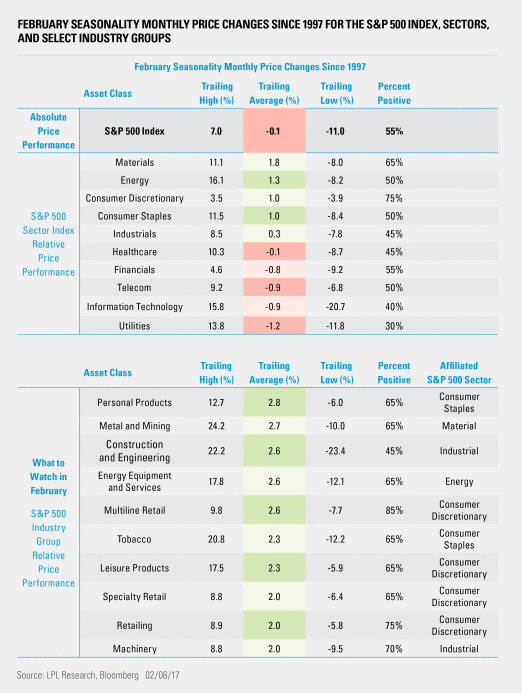by LPL Research
Searching for seasonal patterns can be a useful additional tool when analyzing sector performance. Here in February, we are encouraged by three sectors’ seasonal tendency to outperform the S&P 500: materials, energy, and consumer discretionary. This relative outperformance stands out in our review of the last 20 years of S&P 500 returns in February, a month in which the index has averaged flat to modestly negative with a positive return 55% of the time.
The S&P 500’s average price change for February has been -0.13%, with a best return of 7.0% and a worst return of -11% since 1997. Comparing the price performance of an underlying sector or industry group with the broad-based index over a specific period can help identify potentially strong seasonal performers. However, performance is often driven by factors other than seasonality.
The sectors and industry groups that have outperformed the S&P 500 in February on average since 1997 are highlighted in green in the table below; those that underperformed the index are highlighted in red.
Let’s take a closer look at three areas of historical S&P 500 sector relative strength over the past 20 years.
Materials Sector Has Outperformed S&P 500 by Average of 1.8% Since 1997
The materials sector has outperformed the S&P 500 Index in February by an average of 1.8%, with a high return of 11.1% and a low return of -8.0%. Digging deeper, the S&P 500 Metal and Mining Industry Index has outperformed the S&P 500 Index by 2.8% in February on average, with a high of 24.2% and a low of -2.7%.
Energy Sector Has Outperformed Broad-Based Stocks by Average of 1.3% Since 1997
The energy sector has also tended to outperform broad-based stocks during this period. The S&P 500 energy sector has outperformed by an average of 1.3%, with a high of 16.1% and a low of -8.2% since 1997. The S&P 500 energy equipment and services industry group outperformed the equity benchmark by 2.6% on average, with a high of 17.8% and a low of -12.1%.
Consumer Discretionary Sector Has Outperformed Broad-Based Stocks by Average of 1% Since 1997
The consumer discretionary sector has outperformed the S&P 500 index by 1.0% on average, with a high of 3.5% and a low of -3.9% since 1997. We note the following retail industry groups within this sector that have displayed relative strength in February:
- The S&P 500 multi-line retail industry group, which outperformed the equity benchmark by 2.6% on average, with a high of 9.8% and a low of -7.7%.
- The S&P 500 specialty retail industry group, which outperformed the equity benchmark, by 2.0% on average, with a high of 8.8% and a low of -6.4%.
- The S&P 500 retailing industry group, which outperformed the equity benchmark by 2.0% on average, with a high of 8.9% and a low of -5.8%.
Stay tuned to the LPL Research blog for continued reviews of S&P 500 seasonal patterns and data in the months ahead.
IMPORTANT DISCLOSURES
Past performance is no guarantee of future results. All indexes are unmanaged and cannot be invested into directly.
The opinions voiced in this material are for general information only and are not intended to provide or be construed as providing specific investment advice or recommendations for any individual security.
The economic forecasts set forth in the presentation may not develop as predicted.
Investing in stock includes numerous specific risks including: the fluctuation of dividend, loss of principal and potential illiquidity of the investment in a falling market.
Stock investing involves risk including loss of principal.
Because of their narrow focus, specialty sector investing, such as healthcare, financials, or energy, will be subject to greater volatility than investing more broadly across many sectors and companies.
The S&P 500 Index is a capitalization-weighted index of 500 stocks designed to measure performance of the broad domestic economy through changes in the aggregate market value of 500 stocks representing all major industries.
This research material has been prepared by LPL Financial LLC.
To the extent you are receiving investment advice from a separately registered independent investment advisor, please note that LPL Financial LLC is not an affiliate of and makes no representation with respect to such entity.
Not FDIC/NCUA Insured | Not Bank/Credit Union Guaranteed | May Lose Value | Not Guaranteed by any Government Agency | Not a Bank/Credit Union Deposit
Securities and Advisory services offered through LPL Financial LLC, a Registered Investment Advisor Member FINRA/SIPC
Tracking #1-579732 (Exp. 2/18)
Copyright ©














